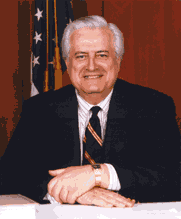 Former U.S. Representative Henry J. Hyde
(R., Ill.),
Former U.S. Representative Henry J. Hyde
(R., Ill.), ...In opposing the Hyde Amendment, DOJ raised other concerns which paradoxically illustrated just why such a bill was crucial to the fairness of our justice system. DOJ argued, for example, that the amendment would force prosecutors to make decisions "with one eye on their office budget," presumably because awards under the law must come directly from the appropriations made to the prosecuting offices that initiated or maintained the unjustified prosecutions. Further, in a startling bit of hyperbole, the Justice Department argued that "[p]lea bargains that save time and put criminals behind bars could become a thing of the past."13 The Department of Justice seemingly was substituting its own vision of expediency for a fair system of justice. After all, it can hardly be disputed that defendants should not be encouraged to plead guilty to meritless charges solely to avoid the economic expense of a trial.